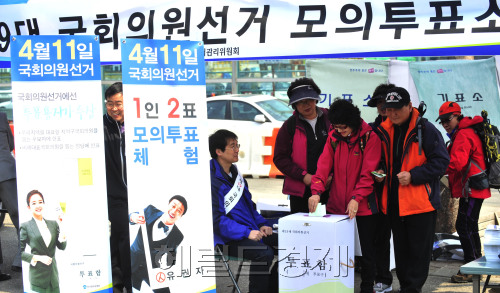Voter turnout is expected to be a major variable affecting the outcome of Wednesday’s general elections as polls show candidates of rival parties neck and neck in scores of constituencies, analysts said Sunday.
With rain forecast across the nation on the morning of polling day, they also said more young voters, who largely support progressive parties, may show up at polling stations instead of going out for recreation.
As younger voters in their 20s and 30s have gained growing political influence thanks to online activities through social networking services, their electoral participation has been regarded as a critical factor in the major elections this year.
Electoral history indicates that a higher turnout tends to favor the liberal opposition camp, which is more popular among young, progressive voters. Experts say 50 percent is the tipping point.
In a recent telephone survey of 1,500 voters across the country, more than 58 percent said they would “definitely” cast their ballots in the upcoming elections, seen as a crucial gauge of public sentiment prior to the presidential poll in December.
With rain forecast across the nation on the morning of polling day, they also said more young voters, who largely support progressive parties, may show up at polling stations instead of going out for recreation.
As younger voters in their 20s and 30s have gained growing political influence thanks to online activities through social networking services, their electoral participation has been regarded as a critical factor in the major elections this year.
Electoral history indicates that a higher turnout tends to favor the liberal opposition camp, which is more popular among young, progressive voters. Experts say 50 percent is the tipping point.
In a recent telephone survey of 1,500 voters across the country, more than 58 percent said they would “definitely” cast their ballots in the upcoming elections, seen as a crucial gauge of public sentiment prior to the presidential poll in December.

Commissioned by the National Election Commission, the survey was conducted by the local pollster Korea Research Center from April 1-3.
As there have been a series of issues that have roiled the electorate as well as political circles, more voters are expected to come out to “deliver judgment” on parties and the incumbent government, observers presumed.
Contentious issues include the government’s allegedly illicit surveillance of civilians; vulgar, ageist and sexist remarks by an opposition candidate; plus academic plagiarism by a ruling party candidate.
“Though there are scandals affecting the opposition camp, there is an overall atmosphere where people feel like delivering judgment on the incumbent administration. Thus, the possibility is quite high that more young voters will come out to the polls,” Ahn Won-il, head of the local pollster Research View, said in a media interview.
In the history of parliamentary elections, higher voter participation worked in favor of the liberal parties.
In the 2004 elections, held after fierce political fighting over conservatives’ attempt to impeach then-President Roh Moo-hyun, voter turnout was 60.6 percent.
The liberal Uri Party, a precursor to the main opposition Democratic United Party, won 152 of the total 299 seats at the National Assembly in the elections while the conservative Grand National Party, now the Saenuri Party, held 121.
At the time, 44.7 percent of eligible voters in their 20s and 56.5 percent of the voters in their 30s participated in the elections.
Four years later in the 18th parliamentary polls, turnout was recorded at 28.1 percent for voters in their 20s and 35.5 percent for those in their 30s ― a significant drop.
In the elections, the GNP gained 153 seats while the then-Democratic Party garnered a mere 81.
Weather is also expected to affect the outcome of the upcoming elections. The state weather forecaster said Sunday that rain was expected across the nation until the morning of the election, after beginning to fall the previous day.
Observers said that when weather is good on voting day, young voters tend to go out with their friends rather than voting. However, older voters are less likely to be affected by weather, they said.
Some, however, dismissed the claim, saying that whether voters are interested in exercising their democratic right is a crucial factor, not the weather itself. They also said that now polling stations are installed in locations close to their homes, there is little correlation between weather and voter turnout.
By Song Sang-ho (sshluck@heraldcorp.com)
-
Articles by Korea Herald


![[Weekender] 'Blood doesn't make family, love does'](http://res.heraldm.com/phpwas/restmb_idxmake.php?idx=644&simg=/content/image/2024/05/23/20240523050792_0.jpg&u=20240525160812)











![[AFRICA FORUM] Korea-Africa forum explores pathways to prosperity](http://res.heraldm.com/phpwas/restmb_idxmake.php?idx=652&simg=/content/image/2024/05/26/20240526050137_0.jpg&u=20240526174935)

![[AFRICA FORUM] Korea ready to be Africa’s partner in success: Vice FM](http://res.heraldm.com/phpwas/restmb_idxmake.php?idx=652&simg=/content/image/2024/05/26/20240526050125_0.jpg&u=20240526153144)

![[Herald Interview] SM subsidiary KMR aims to broaden K-pop spectrum](http://res.heraldm.com/phpwas/restmb_idxmake.php?idx=652&simg=/content/image/2024/05/26/20240526050203_0.jpg&u=)
